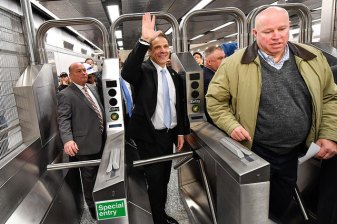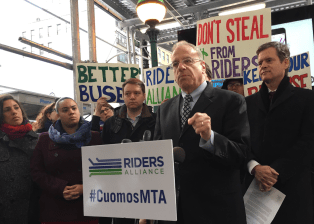Cuomo Cuts $100 Million to Transit [Updated]
 Reactions to Governor Cuomo’s proposed budget are beginning to come in. The cuts to transit, which are being pegged at $100 million, are being portrayed as painful, though perhaps not devastating.
Reactions to Governor Cuomo’s proposed budget are beginning to come in. The cuts to transit, which are being pegged at $100 million, are being portrayed as painful, though perhaps not devastating.
The MTA itself sees Cuomo’s plan as cutting $100 million from its budget, not the $57 million we estimated earlier. That’s $200 million in raids on dedicated transit funds, offset by $100 million in economic development aid to the capital program.
We’re still looking into why the $43 million in increased operating aid that the Cuomo administration mentioned in its press release doesn’t seem to be a part of the MTA’s math. It may be that increase was expected, in the form of increased payroll tax revenue, say, and therefore not truly a new budget action.
In a press release, the MTA stated:
Because the MTA has already taken unprecedented measures to reduce costs, finding an additional $100 million in 2011 will be very painful, especially with sizable deficits still projected for 2012 and 2014. As we continue cost-cutting, further reductions become harder and harder to achieve.
But we must fill this gap, and we will fill it without resorting to fare and toll increases or service cuts, because our riders have already been hit with these painful measures over the past year.
The transit agency continues to note that it will try to find that $100 million through efficiencies, and that it hopes labor will cooperate in increasing productivity.
The Drum Major Institute’s John Petro also scores the budget’s impact as a $100 million cut. As Petro notes in a post on DMIBlog, Cuomo is proposing not only a cut to the MTA, but a shift from the operating budget to the capital plan:
While it is essential that the governor and legislature find ways to fully fund the MTA’s capital program, which has a nearly $10 billion hole, taking critical funds used to maintain good service is not appropriate. Nor is $100 million, or even $294 million if the Bond Act funds are included, enough to begin plugging the capital budget hole.
A $200 million raid on the operating budget is, in fact, significantly larger than the $143 million dollar theft last year that triggered unprecedented service cuts and fare hikes. The new cuts come when the lowest-hanging fruit — the least intrusive service cuts and most easily-implemented efficiencies — has already been plucked.
Update: The net impact on the operating budget will only be $100 million, according to the Straphangers’ Campaign’s Gene Russianoff. The intent is for the $100 million in re-directed economic development aid to pay for capital projects that would otherwise have been paid for out of the operating budget, he said. Those operating funds will be freed up to pay for service. As a result, the net loss for the MTA is $100 million, which will come exclusively from the operating budget — a somewhat smaller hit than the agency absorbed last year.
Petro also warns that the MTA can honor its promise of avoiding further service cuts while still in practice reducing service. It could clean the subways less frequently, or cancel bus runs if the driver calls in sick, for example.
His ultimate conclusion: “Cuts like these will make it nearly impossible for the MTA to improve service and to update the region’s mass transit system for the 21st century.”
The Straphanger’s Campaign’s Gene Russianoff had a more optimistic take on the budget. “Governor Andrew Cuomo’s proposed state budget has mostly good news for New York City-area transit riders in these tough economic times,” wrote Russianoff in a statement. Though he noted the $100 million raid, Russianoff focused on the fact that service cuts and fare increases will be avoided for now. “That’s very welcome after an unprecedented three years in a row of higher fares – as well as last year’s service cuts, the worst in memory,” he said.

